Politics
Terror-free Türkiye set to head to Parliament
Ömer Çelik, spokesperson for the ruling Justice and Development Party (AK Party), told reporters on Sunday that it would take merely days before Parliament would set up a committee on the terror-free Türkiye initiative.
The committee is essential for a legal framework of the initiative that accomplished more than half of what it set out to with the first group of terrorist group PKK members abandoning their arms on Friday. Friday’s disarmament ceremony in northern Iraq was a historic turning point in Türkiye’s fight against terrorism for more than 40 years.
The initiative launched by government ally Nationalist Movement Party (MHP) last year is expected to proceed with full disarmament of the PKK and steps to formally end its existence. The terrorist group’s jailed leader, Abdullah Öcalan, and other actors in the initiative have underlined that a parliamentary committee was a necessity for the terror-free Türkiye plan they often refer to as a “peace process.” The committee is supposed to tackle the future of disarmed PKK members and address the fate of imprisoned terrorists.
Çelik was among AK Party members who joined President Recep Tayyip Erdoğan for the party’s traditional “consultation camp” in Ankara’s Kızılcahamam district that began on Friday. He said that the party discussed everything “from security to justice” during the meetings and noted that Erdoğan’s speech on Saturday in Kızılcahamam had global repercussions, referring to the president’s description of the process as a new era. “Terrorism will end,” Çelik told reporters. He added that the disarmament should continue without interruption. “All wings of the PKK should lay down arms and cease to exist,” he said. The PKK has wings in Iran and Syria, while the first stage of disarmament is expected to involve groups in Iraq.
The spokesperson said previous governments also sought to disarm the PKK, noting that the state pursued both military means and soft power to address the issue. He underlined that the disarmament was not a result of “a bargain between the state and the PKK.” “Türkiye’s power in counterterrorism is clear. This is simply a work to end terrorism to dominate the agenda in Türkiye. We are open to criticism but you should not accuse others of treason while criticizing them,” he said, in reference to some opposition parties’ criticism of the initiative.
“Efforts will continue. By Allah’s will, full disarmament will happen within a few months,” Çelik noted.
Politics
Türkiye urges swift end to violence in S. Syria, calls for dialogue
Türkiye on Monday expressed hope that the recent surge in violence in southern Syria will be brought to an end swiftly through local dialogue efforts led by the Syrian government.
“We hope that the Syrian Government will bring the incidents of violence to an end as soon as possible through dialogue at the local level, and will establish security in the south of Syria,” Foreign Ministry spokesman Öncü Keçeli said in a statement.
Ankara stressed that Syria’s sovereignty and territorial unity must be prioritized during the process.
“Türkiye will continue to support efforts to strengthen stability and reconciliation in Syria, in coordination with responsible members of the international community,” the statement added.
Syria deployed security forces to the southern province of Suwayda on Monday after clashes between Bedouin and Druze armed groups left at least 50 people dead, a monitoring group said.
The outbreak of violence underscores the challenges facing the administration of interim President Ahmad al-Sharaa, whose anti-regime forces overthrew long-time dictator Bashar Assad in December, in a country reeling from 14 years of war.
Politics
Türkiye left alone in its fight against FETÖ: Justice Minister
Justice Minister Yılmaz Tunç criticized world powers, including the U.S. and the European Union, for ignoring and failing to stand in solidarity with Türkiye in its fight against the Gülenist Terror Group (FETÖ), which was behind the deadly July 15 coup attempt.
Speaking on a live broadcast on a Haber, Tunç said Türkiye was left alone in its fight against the terrorist group.
His comments come as Türkiye prepares to commemorate the 9th anniversary of the coup attempt and martyrs and veterans who resisted the putschists.
Speaking about suspects who fled abroad, Tunç said: “We issued red notice requests both after the Dec. 17-25 judicial coup attempts and before July 15. Unfortunately, the world has left us alone in this regard.”
He noted that the heroic resistance of the Turkish people on the night of the coup attempt was a fight for democracy and human rights, yet countries in Europe and the United States failed to offer the support Türkiye needed.
“We saw no meaningful solidarity that night. Later, we were also disappointed by the lack of cooperation in our fight against FETÖ. Its members settled in various countries across Europe and the United States, and many still remain there,” he said.
According to Tunç, Türkiye has submitted 2,364 extradition requests to 118 countries but has received only 131 returns — just three through official channels, and 128 through unofficial deportations. He also noted that out of 3,579 red notice requests, many have gone unanswered, with Interpol allegedly treating them as if they involved political crimes.
“This reflects the double standards of the international community. While Türkiye was waging a democratic struggle on the night of July 15, Europe — including countries we call allies — failed to stand by us,” he added.
Tunç also stressed the importance of remaining vigilant, not just against FETÖ but all terrorist threats targeting the country.
“We must always stay alert. The tutelage mindset and coup ambitions must never again be allowed to seize power in this country. We’ve made significant progress in that regard,” he said.
The coup attempt unfolded almost simultaneously across Türkiye on the evening of July 15, 2016, and was suppressed by noon the next day. Erdoğan, who narrowly avoided an assassination attempt by putschists while he was on vacation in southwestern Türkiye, traveled to Istanbul secretly. During and after his trip to the city, he issued several messages through video phone calls to TVs, mobilizing the nation to “reclaim democracy.” After his calls, more people took to the streets, braving heavily armed putschists. Unarmed people blocked the roads against tanks and legions of pro-FETÖ troops. Gunfire by putschists killed 253 people, while 2,740 others were injured.
For decades, FETÖ had secretly infiltrated state institutions, including the army. It sought to overthrow the government and conspired against top officials, from sham investigations to a plot targeting then intelligence chief Hakan Fidan. It also conducted two notorious coup attempts in December 2013 that targeted people close to the government, including an incident where pro-FETÖ officials stopped trucks belonging to the intelligence agency in a bid to portray the government in a negative light.
Their efforts repeatedly failed, and the government moved to weed out military officers linked to the group from the army in 2016. Upon learning the plans, FETÖ turned to mobilizing its infiltrators in the army to seize power.
Politics
Türkiye clamps down on FETÖ on anniversary of coup attempt
Security forces on Tuesday launched a new round of operations in separate investigations against the Gülenist Terror Group (FETÖ), which attempted to overthrow the government on July 15, 2016, through its infiltrators in the Turkish Armed Forces (TSK).
A supermarket chain and secret networks of the terrorist group accused of financing FETÖ were the target of the crackdown that indicated FETÖ still seeks revival nine years after it spectacularly failed to seize power.
In an Istanbul-based investigation, security forces detained 26 suspects, including Z.D., owner of Hakmar and Tatbak, a supermarket and pastry shop chain primarily operating on Istanbul’s Asian side. Authorities also appointed trustees to the chain on the grounds of financing FETÖ. The operation was a joint effort between the Istanbul police and the National Intelligence Organization (MIT), involving 9 provinces.
Security sources said Z.D., whose chain operates some 800 branches and C.G., a former police officer fired on suspicion of links to FETÖ earlier, have been under surveillance for a while on suspicion of funding the terrorist group. Sources said Z.D. was quite loyal to the group, quoted on one occasion as saying he was ready to sacrifice his fortune for FETÖ leader Fetullah Gülen, “to whom I owe my rise in the business.” A search of Z.D.’s residence found materials linking him to FETÖ, sources said. FETÖ is known for its widespread infiltration into state institutions in the past and has also wielded influence in business circles as well, through a now-defunct business chamber that its members founded. Past investigations have shown that FETÖ also threatened businesspeople who refused to “donate” to the group by harming their businesses.
Z.D. is accused of receiving instructions from FETÖ members abroad for the transfer of funds to the group’s members and utilizing his businesses accordingly. The suspect had already received numerous complaints for collecting donations to FETÖ under the guise of charity. Sources reported that he also employed individuals with ties to the group in his supermarket chain. Operations were held to capture Z.D. and other suspects in Istanbul, Ankara, Sakarya, Osmaniye, Bayburt, Giresun, Malatya, Yalova and Bolu. Along with Z.D., C.G. was detained. Security forces searching the headquarters of Hakmar in Istanbul’s Sancaktepe district found a multitude of doors equipped with encryption systems and top-of-the-line security systems. Sources said such doors installed adjacent to each other were used by the terrorist group to gain time against police raids. This practice was also used by the Revolutionary People’s Liberation Party-Front (DHKP-C), another terrorist group. Sources said secure rooms in the building were used for secret meetings of FETÖ members.
The investigation found that Z.D. utilized Hakmar and Tatbak companies for transferring funds to FETÖ. C.G., who was also an employee of Hakmar, visited several cities to hand over cash to members of the group.
In another operation based in Istanbul, authorities detained 51 suspects. Operations were held in 15 provinces and targeted a restructured network of FETÖ, whose members fled or went into hiding after an intensified crackdown on the group following the 2016 coup attempt. The suspects were members of a network who allegedly infiltrated the Ministry of National Education. The investigation that led to detentions on Tuesday found that they regularly held meetings, either through videoconference or in a location in Istanbul, to reinforce bonds between members, sought to recruit new members and arranged marriages between members, a well-known practice of FETÖ. Earlier investigations and confessions by former FETÖ members had revealed that the group’s so-called “imams” or handlers forced members into marriage with each other and even picked spouses for them. Security forces found that five suspects wanted in the investigation had fled Türkiye earlier, while operations are underway to capture seven suspects at large.
Police discovered a stash of cash, books written by Gülen and digital evidence regarding the suspects’ affiliation with FETÖ during the search of premises raided during the operations.
In an operation based in the western city of Izmir, where Fetullah Gülen rose to prominence as a popular preacher in the 1960s, authorities issued detention warrants for 371 suspects. Two hundred forty-four of them have been detained so far in operations across 60 provinces. The suspects are accused of financing FETÖ. Financial crimes police discovered that suspects sent cash to fugitive FETÖ members abroad.
Security sources reported that the suspects allegedly faked online food sales to transfer cash to fellow FETÖ members secretly. A manhunt is underway for 61 suspects in the case, while 79 suspects have been identified as being at large abroad.
The investigation revealed that the suspects set up an illegal online system and had a monetary flow of approximately TL 7.5 million between themselves and fugitive FETÖ members in North America and Europe.
Elsewhere, authorities ordered the detention of 14 suspects in seven provinces as part of an investigation into exam fraud in 2010 and 2011 for admission to schools training gendarmerie officers. The suspects are accused of obtaining questions for exams beforehand, a common tactic employed by FETÖ for infiltrating state institutions.
Separately, Interior Minister Ali Yerlikaya announced on Tuesday that 306 suspects were captured in operations against FETÖ over the past two days in 64 provinces.
Politics
US-backed terrorist group YPG insists on autonomy after Damascus talks
The U.S.-backed YPG, the Syria wing of the terrorist group PKK, reiterated its call for autonomy in Syria’s northeast while the new administration in Damascus seeks its integration into the Syrian army. YPG members called again on Sunday for a system of government that preserves a measure of their self-styled autonomy, days after Damascus rejected “any form” of decentralization. YPG leader Ferhat Abdi Şahin and interim President Ahmed al-Sharaa first struck an accord in March to integrate the YPG into the state, but its implementation has been held up by differences between the two sides.
The pair met again on Wednesday in the presence of a U.S. envoy to discuss the stalled efforts, but Damascus afterward reiterated its opposition to “any form of division or federalization” and called for YPG members to be absorbed into the army.
In a statement Sunday, the YPG called “for a pluralistic democratic system, social justice, gender equality and a constitution that guarantees the rights of all components” of society. “Today, we aspire to be effective partners in building a new Syria, a decentralized Syria that embraces all its people and guarantees their rights equally,” it said.
The YPG controls vast swathes of territory in Syria’s north, including oil and gas fields. With the support of a Washington-led coalition, the YPG positioned itself as a partner in the fight against fellow terrorist group Daesh.
The terrorist group in its current form remains a security concern for Syria’s neighbor Türkiye. Ankara expects them to join the PKK, which started a disarmament process last Friday, or properly integrate into the Syrian army.
U.S. Ambassador to Türkiye and Special Envoy for Syria Tom Barrack said that if the YPG does not act quickly on integration, it will face problems with the Turkish and Syrian governments. “The U.S. will do its best to ensure a fair and proper decision is made. If they want to come to America and live with us, they can do so.” Barrack told Anadolu Agency (AA) following his press conference in New York last Friday.
He explained the origins of the groups by saying, “The YPG emerged from various offshoots of the PKK, and the Syrian Democratic Forces (SDF) emerged from various offshoots of the YPG.” When reminded of his previous statement that “the SDF is the YPG and the YPG is a derivative of the PKK,” he emphasized, “I have never said that the SDF is a derivative of the PKK.” “It’s not unthinkable that whoever the constituency is for the YPG or the SDF has distanced themselves from the PKK. So, I don’t think it’s a derivative. It’s another organization,” Barrack told AA.
When reminded that the terrorist group YPG, which uses the name SDF in Syria, has sent messages about the need to use time effectively in the integration process, and asked what problems might arise if they do not, Barrack responded: “The problems that will arise are disagreements with the Syrian government and the Türkiye government. The U.S. government has stated that it will review all their issues and do its best to ensure a fair and accurate decision. If they want to come to America and live with us, they can do so.”
Bashar Assad, Syria’s leader for nearly 25 years, fled to Russia on Dec. 8, ending the Baath Party’s regime, which had been in power since 1963. Ahmed al-Sharaa, who led anti-regime forces to oust Assad, was declared president for a transitional period on Jan. 29.
In its 40-year terror campaign against Türkiye, the PKK, listed as a terror organization by Türkiye, the U.S. and the EU, has been responsible for the deaths of more than 40,000 victims, including women, children and infants.
Regarding the reasons why talks between the SDF and the Syrian government have not yielded results, Barrack said the actual issue is whether it will align with the Syrian Arab Republic. “One country, one nation, one military is dictated by that nation, which we’re now recognizing. So that’s the issue. Forget about whatever the genetics are from where it came. All of these minority groups might lust for a federalistic environment.
“That’s not what’s being dictated to them to be invited into. That’s not up to us. It’s not up to us to referee the intellectual discussion. Is that the right thing? Is that the wrong thing? Do you want a parliamentary system? Do you want a republic? Do you want a confessional system? How do you blend and protect minority rights? All of us, the U.N. in particular, are cheering and saying this is really important if you want our help. These are the requirements that we want to see,” said Barrack. “We want to see what you’re going to do with foreign fighters. Are you integrating them? Are you not integrating them? Are you sending them home or not?”
Barrack said the integration between the SDF and the Syrian government will take time “because there’s no trust” between the parties. “There’s not enough specifics in the agreement to have made it work.” He noted that the U.S. is trying to “punctuate those specifications so they can come together.” Barrack also said he believes that the parties are going to “come together and that would be a beautiful marriage.”
Politics
Democracy, national unity stronger on Türkiye’s coup bid anniversary
Türkiye on Tuesday will mark the ninth anniversary of a coup attempt by the Gülenist Terror Group (FETÖ). Declared Democracy and National Unity Day a few months after the attempt, July 15 is an occasion to celebrate unprecedented public resistance against the putsch.
Nine years on, the country’s democracy remains unshaken, while national unity symbolized by people sacrificing their lives to protect their will to elect their own leaders, appears stronger with new steps. Indeed, as President Recep Tayyip Erdoğan promoted, the unity is reflected in the terror-free Türkiye initiative that aims to end decades of PKK terrorism. The PKK long exploited the country’s Kurdish community to advance its agenda for a so-called Kurdistan and attempts to end PKK’s violent campaign were occasionally hindered by the fact that the state chose to ignore the rights of the community and sometimes, outright antagonized them through counterterrorism policies that did not discriminate between the community’s members sympathizing with the PKK and those who had nothing to do with the terrorist group.
Through the 2016 coup attempt, FETÖ, which faced increased scrutiny after its first coup attempts by its members in the judiciary and law enforcement, sought to curb an expected crackdown on its military infiltrators. Ultimately, its goal was to rule the country with a military junta loyal to FETÖ leader Fetullah Gülen.
Since the first coup in 1960, Türkiye has been accustomed to military takeovers. Some were straightforward, like the 1980 coup when Chief of General Staff Kenan Evren conspired with fellow commanders to seize power. Others, like FETÖ’s coup attempts in 2013 and a 1997 coup where the military issued a stern memorandum to the government instead of rolling out tanks on the streets, were more discreet. But none faced strong opposition from the public. The resistance is credited to Erdoğan, who is now among longest longest-serving leaders of Türkiye, first as prime minister and then as president. Erdoğan’s call to the public to reclaim democracy as the coup attempt unfolded led to confrontations between the putschists and the unarmed public. Eager to defend their right to democracy, thousands sought to convince the putschists to lay down arms, and when it failed, they tried to block the roads of tanks and troops across Türkiye. Apparently taken aback by the resistance, the putschists had to withdraw and were subsequently arrested by police and military officers opposing the attempt.
The coup attempt was followed by days of a “democracy watch” where people in 81 provinces held nightly vigils to remember victims and demonstrate their adherence to democracy, in a bid to deter future coup attempts.
The victory of democracy was cemented in the 2018 presidential elections Erdoğan won again, one year after a referendum introduced Türkiye to an executive presidency system. In 2022, Erdoğan unveiled the country’s “Century of Türkiye” vision, an ambitious set of reforms and steps that will be taken in the second centenary of the Republic of Türkiye. In the next three years, Türkiye enhanced its international standing as a key diplomatic actor serving as mediator of conflicts, a major force in the defense industry, and nowadays seeks to crown it by putting an end to more than 40 years of terrorism by the PKK, a main obstacle for development of the country. In Erdoğan’s words, the disarmament of the PKK, which began with 30 terrorists burning down their weapons last Friday, is the dawn of a new era for the country, a new era for renewed unity of communities and for the wider region that is plagued by Israel’s expansionist policies.
Significant visit
Success against the coup attempt was not without sacrifices. Some 253 people were killed by putschists and hundreds of others were injured while trying to stop the coup attempt. Some died outside the Presidential Complex, others were martyred while protecting the president, who faced an assassination attempt. Among them were military officers who bravely fought against putschists at the army headquarters and more than a dozen people who rushed to a major bridge in Istanbul when they heard the putschists had occupied it.
Mehmet, Hakan and Lütfi were among them. Two brothers and their brother-in-law had joined a crowd gathered outside the Presidential Complex to block putschists from taking it over. Their 99-year-old mother, Muzaffer Gülşen, who lives in Ankara, had a special visitor on Monday: the very president her sons and son-in-law died while defending. Accompanied by local officials, Erdoğan received a warm welcome from Gülşen and her family. Together, they recited prayers for those killed by putschists and the president extended his condolences to the elderly woman. During the visit, Gülşen handed the president her savings, asking for their donation to Palestinian children suffering under Israel’s attacks.
Politics
Former Esenyurt mayor released from case over alleged PKK ties
The Republican People’s Party’s (CHP) former Esenyurt Mayor Ahmet Özer, who was suspended from office following his arrest over alleged membership in the PKK terrorist group, was released from the terrorism case on Monday.
Özer, who was arrested on January 21 as part of the investigation into the criminal organization allegedly led by Aziz İhsan Aktaş by the Istanbul Chief Public Prosecutor’s Office, will not be released from prison.
Özer was released from the PKK case after facing a prison sentence of seven years, six months to 15 years.
The hearing, held by the Istanbul 14th High Criminal Court in a courtroom across from Marmara Prison, was attended by the defendant Özer.
The hearing was also attended by CHP Deputy Parliamentary Group Chair Gökhan Günaydın, Istanbul Metropolitan Municipality Deputy Mayor Nuri Aslan, CHP Istanbul Provincial Chair Özgür Çelik, Dilek Kaya Imamoğlu and several other party members.
Özer argued that he has been detained for nine months, that he is accused of fabricated crimes, and that he and his lawyers have refuted the allegations of witnesses and secret witnesses.
“With the destruction of weapons on July 11, we entered a new era. There is a huge contradiction between the peace process and my continued detention. Everyone from right to left is writing this. I am not a member of a terrorist organization. I am not a member of any organization.”
Özer was referring to the ongoing terror-free Türkiye process initiated by the government.
-
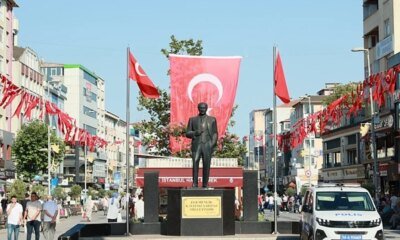
 Daily Agenda1 day ago
Daily Agenda1 day agoFlags are fluctuating for Türkiye without terrorism
-

 Sports1 day ago
Sports1 day agoConfusion hits as Trump joins Chelsea’s Club World Cup celebrations
-
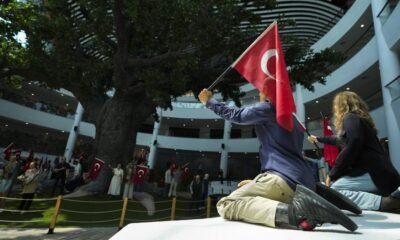
 Economy1 day ago
Economy1 day ago9 years on, business community salutes ‘inspiring spirit’ of July 15
-
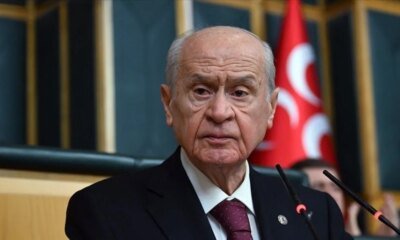
 Daily Agenda1 day ago
Daily Agenda1 day agoMHP leader Devlet Bahceli from July 15 Message: The head of the traitors was crushed
-
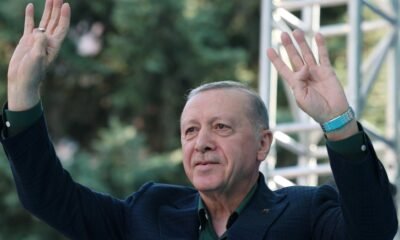
 Politics1 day ago
Politics1 day agoLeaders hail terror-free Türkiye success in phone calls with Erdoğan
-
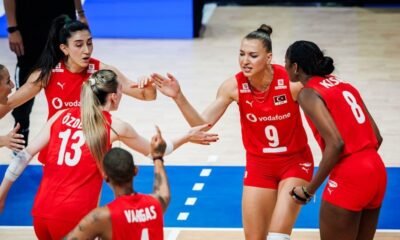
 Sports1 day ago
Sports1 day agoTurkish Sultans of Net to face Japan for Nations League semis spot
-

 Economy1 day ago
Economy1 day agoSilver prices hit highest level since 2011 amid trade tensions
-
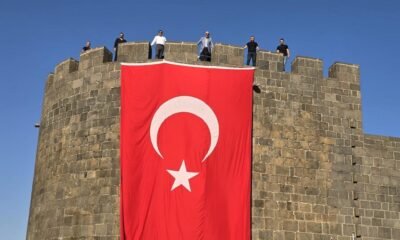
 Politics1 day ago
Politics1 day agoTürkiye welcomes PKK disarmament with flags, good wishes




